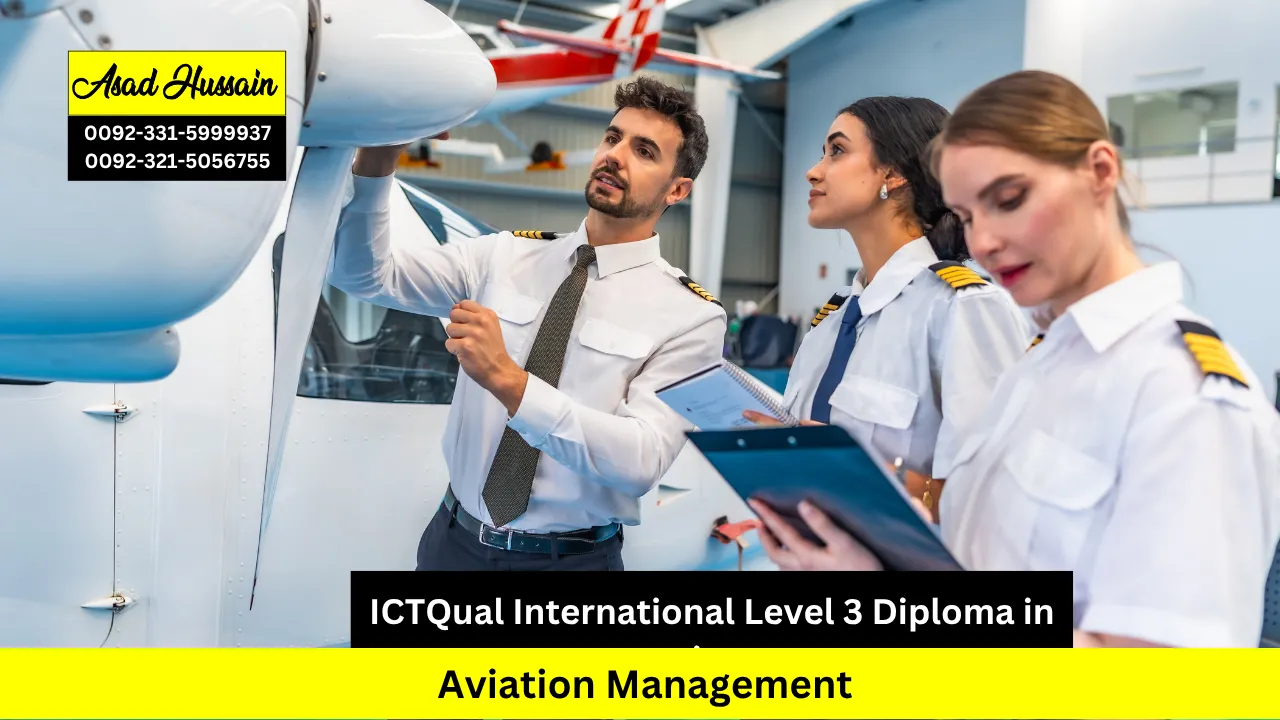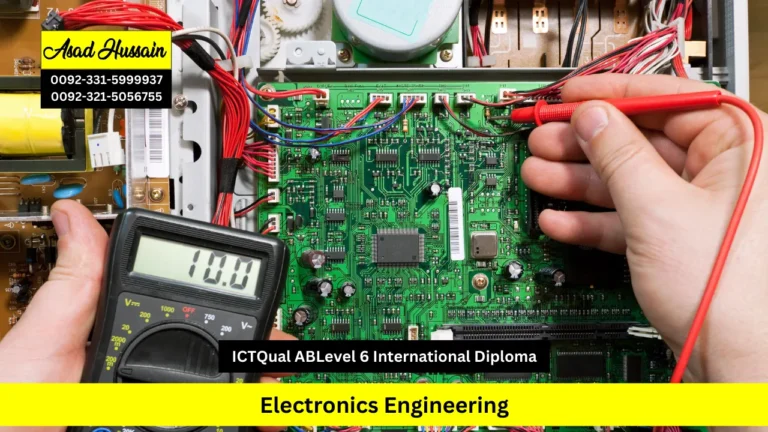The ICTQual International Level 3 Diploma in Aviation Management is a globally recognized qualification designed for individuals aspiring to build a successful career in the aviation industry. With air travel continuing to expand worldwide, the demand for skilled professionals in aviation management has never been greater. This diploma provides learners with the essential knowledge, practical skills, and industry insights required to thrive in one of the most dynamic and fast‑growing sectors of the global economy.
This program covers a wide range of core topics, including airline operations, airport management, aviation safety, customer service, and regulatory frameworks. By focusing on both theoretical understanding and practical application, the diploma ensures that learners are well‑prepared to handle the challenges of modern aviation. Whether you are new to the industry or looking to enhance your existing expertise, this qualification offers a solid foundation for professional growth.
One of the key strengths of the ICTQual Level 3 Diploma in Aviation Management is its international relevance. The curriculum is designed to meet global standards, making it suitable for learners from diverse backgrounds who wish to pursue careers in airlines, airports, ground handling companies, or aviation regulatory bodies. The program also emphasizes leadership, communication, and problem‑solving skills, which are critical for effective management in a highly competitive environment.
Completing this diploma not only enhances your employability but also opens doors to further academic progression and career advancement. Graduates can pursue higher‑level qualifications in aviation or related fields, or step directly into rewarding roles within the industry. With its comprehensive approach and international recognition, the ICTQual International Level 3 Diploma in Aviation Management is the perfect stepping stone for anyone aiming to excel in the world of aviation.
Program Highlights
Mandatory Units
This qualification, the ICTQual International Level 3 Diploma in Aviation Management, consists of 6 mandatory units.
- Aviation Industry Structure and Global Regulations
- Airline Operations and Fleet Management
- Airport Management and Ground Handling Systems
- Aviation Safety and Risk Management
- Customer Service Excellence in Aviation
- Professional Development and Career Pathways in Aviation
To enroll in the ICTQual International Level 3 Diploma in Aviation Management, learners are expected to meet the following entry requirements:
- Age Requirement: Applicants should generally be 18 years or older at the time of enrollment.
- Educational Background: A secondary school qualification (or equivalent) is recommended. Learners with prior studies in business, management, or travel and tourism will find it especially beneficial, though it is not mandatory.
- English Language Proficiency: Since the program is delivered in English, learners should demonstrate a good command of written and spoken English. This may be shown through prior education in English or an equivalent language qualification.
- Work Experience (Optional): While not compulsory, individuals with some exposure to the aviation, travel, or customer service sectors may gain additional advantages in understanding the course content.
- Motivation and Commitment: Applicants should have a genuine interest in aviation and a willingness to engage in both theoretical and practical aspects of management training.
Learning Outcomes for the ICTQual International Level 3 Diploma in Aviation Management:
1. Aviation Industry Structure and Global Regulations
By the end of this unit, learners will be able to:
- Explain the structure of the global aviation industry and its key stakeholders.
- Identify the roles of international regulatory bodies such as ICAO, IATA, and EASA.
- Analyse how global regulations impact airline and airport operations.
- Demonstrate awareness of bilateral and multilateral air service agreements.
- Recognise the importance of compliance with international aviation law.
- Evaluate the effects of globalisation on aviation growth and connectivity.
- Apply knowledge of regulatory frameworks to real‑world aviation scenarios.
- Understand the relationship between national authorities and global aviation governance.
2. Airline Operations and Fleet Management
By the end of this unit, learners will be able to:
- Describe the core functions of airline operations management.
- Explain the principles of fleet planning and aircraft utilisation.
- Analyse the importance of scheduling, route planning, and network design.
- Demonstrate understanding of crew management and operational efficiency.
- Recognise the impact of fuel, maintenance, and cost control on fleet management.
- Evaluate the role of technology in supporting airline operations.
- Apply operational concepts to improve airline performance.
- Understand the challenges of balancing profitability with service quality.
3. Airport Management and Ground Handling Systems
By the end of this unit, learners will be able to:
- Explain the organisational structure of modern airports.
- Identify the key functions of ground handling services.
- Analyse the processes involved in passenger and baggage handling.
- Demonstrate understanding of airside and landside operations.
- Recognise the importance of coordination between airlines and airport authorities.
- Evaluate the role of technology in airport and ground handling efficiency.
- Apply knowledge of airport management to improve passenger flow.
- Understand the impact of disruptions on airport operations and service delivery.
4. Aviation Safety and Risk Management
By the end of this unit, learners will be able to:
- Explain the principles of aviation safety management systems (SMS).
- Identify common risks and hazards in aviation operations.
- Analyse the role of risk assessment in preventing accidents.
- Demonstrate awareness of international safety regulations and compliance.
- Recognise the importance of safety culture within aviation organisations.
- Evaluate the effectiveness of emergency response and contingency planning.
- Apply risk management techniques to aviation scenarios.
- Understand the link between safety, efficiency, and passenger confidence.
5. Customer Service Excellence in Aviation
By the end of this unit, learners will be able to:
- Explain the importance of customer service in aviation competitiveness.
- Identify the key elements of delivering high‑quality passenger experiences.
- Analyse the relationship between service quality and brand reputation.
- Demonstrate effective communication and interpersonal skills.
- Recognise the role of cultural awareness in international aviation service.
- Evaluate strategies for handling complaints and service recovery.
- Apply customer service principles to real‑world aviation contexts.
- Understand how technology enhances customer service delivery.
6. Professional Development and Career Pathways in Aviation
By the end of this unit, learners will be able to:
- Identify career opportunities across the aviation industry.
- Analyse the skills and qualifications required for different aviation roles.
- Demonstrate awareness of professional standards and ethical responsibilities.
- Recognise the importance of continuous professional development (CPD).
- Evaluate personal strengths and areas for improvement in career planning.
- Apply reflective learning techniques to professional growth.
- Develop a personal career development plan aligned with aviation pathways.
- Understand the value of networking and industry engagement for career success
The ICTQual International Level 3 Diploma in Aviation Management is a prestigious qualification designed to prepare learners for exciting careers in the global aviation industry. As air travel continues to expand and evolve, the demand for skilled professionals who can manage airline operations, airport services, and aviation safety has never been higher. This diploma provides the perfect foundation for individuals who want to enter this fast‑growing sector with confidence and competence.
1. Aspiring Aviation Professionals
- Individuals passionate about building a career in aviation
- Students eager to gain a globally recognized qualification
- Learners who want to understand airline and airport operations
- Those seeking entry‑level roles in aviation management
- People motivated to join one of the fastest‑growing industries
- Candidates looking for a structured pathway into aviation careers
2. Recent School or College Graduates
- Graduates who have completed secondary education or equivalent
- Young learners aiming to specialize in aviation management early
- Students seeking a professional qualification before higher studies
- Individuals wanting to stand out in competitive job markets
- Learners interested in combining academic knowledge with practical skills
- Those who want to explore international career opportunities
3. Airline and Airport Staff
- Ground handling staff aiming for supervisory positions
- Cabin crew members seeking career progression into management
- Customer service agents who want to expand their expertise
- Employees looking for formal recognition of their aviation skills
- Staff members preparing for leadership roles in airlines or airports
- Aviation workers motivated to enhance their professional profile
4. Travel and Tourism Professionals
- Travel agents wishing to broaden their career into aviation
- Tourism professionals aiming to diversify their expertise
- Individuals working in hospitality who want to enter aviation
- Professionals seeking to understand airline and airport operations
- Those looking to strengthen their customer service and management skills
- Workers aiming to connect tourism knowledge with aviation practices
5. Career Changers
- Professionals from unrelated industries seeking a fresh start
- Individuals motivated to transition into aviation management
- Workers looking for a globally relevant qualification to switch careers
- People interested in exploring opportunities in airlines and airports
- Those seeking a stable and rewarding career in aviation
- Mid‑career professionals aiming to re‑skill for a new industry
6. International Learners
- Students from different countries seeking global recognition
- Learners aiming to meet international aviation standards
- Individuals preparing for careers in multiple regions worldwide
- Those who want a qualification accepted across borders
- Learners interested in networking with peers from diverse backgrounds
- Students motivated to pursue higher studies abroad in aviation
7. Future Leaders in Aviation
- Ambitious individuals with long‑term leadership goals
- Learners preparing for managerial or executive roles in aviation
- Students aiming to develop decision‑making and problem‑solving skills
- Individuals who want to strengthen communication and leadership abilities
- Those preparing for higher‑level qualifications in aviation management
- Learners motivated to shape the future of the aviation industry







